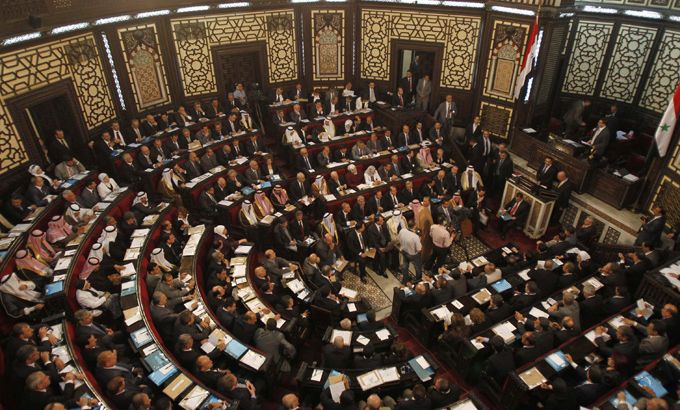Assad says Syria ‘able’ to get out of crisis
President’s remarks come as newly elected parliament convenes and his forces face fresh international criticism.

Bashar al-Assad, the Syrian president, has said that his government will be able to find a way out of the crisis currently gripping Syria.
Thursday’s comments came during a meeting with Reza Taqipour, Iran’s communications and information technology minister.
“Syria has been able to overcome the pressures and threats it has faced for years and is able to get out of this crisis thanks to the strength of its people and commitment to unity and independence,” state media quoted Assad as saying.
According to the state news agency, SANA, Taqipour handed over to Assad an invitation from his Iranian counterpart, Mahmoud Ahmadinejad, to attend a meeting of the Non-Aligned Movement to be held in Tehran in September.
Syria, Iran’s principal ally in the Middle East, has been wracked by a 14-month uprising that has seen more than 12,600 people killed, according to monitors.
Rebels accuse Iran of helping Syrian authorities in their deadly crackdown.
SANA said Thursday’s talks dealt with the situation in Syria, with Taqipour “stressing that what Syria is undergoing comes in the framework of a broader scheme aimed at the entire region”.
Taqipour also “asserted Iran’s firm stance in support of the Syrian people in the face of the extraordinary circumstances they are confronted with”, according to SANA.
Newly elected parliament
Meanwhile, the newly elected 250-member Syrian parliament held its first session in Damascus on Thursday
The body, including 30 women, is the first in which candidates not linked to Assad’s Baath Party were able to run for office.
The parliamentary opposition grouping the Popular Front for Change and Liberation won five seats in the May 7 election, having fielded 45 candidates.
This result was disappointing to the group, but its members accept it as a step towards real change, said Ali Haidar, whose Syrian Social National Party and Qadri Jamil’s Communist Party have banded together to form the Front.
| Amnesty International says the UN Security Council should have taken stronger action over the crisis in Syria |
“We will not boycott the political process at all. Because a boycott means heading towards violence and weapons. We refuse violence, we refuse weapons therefore we insist on continuing in the political process and reform through this process despite all our remarks,” Haidar told Reuters news agency.
For the first time in four decades, the new parliament will be based on a multi-party system that eliminates the Baath party from being the leading party of the state. Yet, Baath won a majority in the parliament.
Khaled al-Abboud, a Syrian parliamentarian representing Deraa, said this was to be expected, because Baath Party had majority support in Syria.
“I am for logical and normal change. I am against synthetic change. I mean I refuse to make up a fact just to present a democratic picture or map of Syria. This would be wrong. You have to let the political society express itself,” Abboud said.
Bassam Imadi, spokesman of the opposition Syrian National Council, told Al Jazeera that the reforms were only valid on paper.
“Real reforms would never come with this regime, because any kind of reform would lead to their downfall – something that they don’t want.”
The new parliament was elected after a new constitution was introduced in the country that has been living in crisis since March 2011 when protests started against Assad’s government.
The new constitution drops a clause making the Baath party the leader of state and society, allowing political pluralism and limiting a president to two seven-year terms.
However, this restriction is not retrospective, implying that Assad, 46 and already in power since 2000, could serve two further terms after his current one expires in 2014.
Security forces blamed
The opposition dismisses the reforms on offer, and says that Assad and his father Hafez, who ruled for 30 years before him, have long paid only lip service to existing legal obligations.
The opening session of the new parliament comes as UN investigators say Syrian government forces have executed entire families in their homes as part of the ongoing crackdown on the opposition.
Both Assad’s troops and opposition fighters were committing gross human-rights violations despite a six-week-old ceasefire in the conflict, but the army and security forces were responsible for most of the crimes documented since March, a UN report said on Thursday.
Children were often victims, it said.
Live Box 2011421105226899357
Government abuses included heavy shelling of residential areas, executions and torture. Syrian forces routinely drew up a list of wanted persons and their families before blockading and then attacking a village or neighbourhood, the report said.
Rebels, who are increasingly armed and well-organised, have executed or tortured captured soldiers and pro-government supporters, it said.
They have also abducted civilians in an apparent bid to secure prison exchanges or ransoms.
The US also released its annual human-rights report for 2011 on Thursday, in which it was particularly harsh on Iran and Syria
The report is an assessment by the US State Department of how each country is working towards safeguarding the rights of individuals.
Al Jazeera’s Alan Fisher, reporting from the State Department in Washington DC, said the report states that Syria “used indiscriminate and deadly force to quell peaceful protests”.